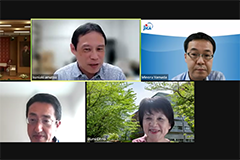Researchers Present Interim Results from the “Japanese Experience of Industrial Development and Development Cooperation: Analysis of Translative Adaptation Processes” Research Project at Industrial Policy Conference in Turkey
2021.12.07
On Oct. 14, 2021, the Smart Economic Planning and Industrial Policy 2021 conference was held online by OSTIM Technical University, Turkey. Researchers participating in the research project “Japanese Experience of Industrial Development and Development Cooperation: Analysis of Translative Adaptation Processes,” conducted by the JICA Ogata Sadako Research Institute for Peace and Development (JICA Ogata Research Institute), shared the results achieved to date at the conference.

Discussion by researchers centered on industrial development and translative adaptation
Project members who virtually participated in the panel session were Ohno Izumi, senior research advisor at the JICA Ogata Research Institute and professor at the National Graduate Institute for Policy Studies; Amatsu Kuniaki, professor at Yamaguchi University; Mori Junichi, chief technical advisor at the International Labour Organization; and Yamada Minoru, executive senior research fellow at the JICA Ogata Research Institute.
Amatsu, who served as the moderator for the session, began by saying that the goal of the session was to discuss ways to shape industrial policies and development cooperation from the perspective of learning from the stakeholders. He proposed 3 discussion points, including why we should discuss industrial development now, what translative adaptation is, and what it has to offer to donor countries and organizations.
The first panelist, Ohno, explained why industrial policy matters now and why it is worth revisiting Japanese experiences of industrial development and development cooperation. She then introduced the concept of translative adaptation, which is the central idea of this research project. It is “the process of learning, internalizing foreign knowledge and skills, and adapting them to one's own culture and customs,” she said. As a message for countries aspiring for industrial catch-up, she emphasized that they should not simply replicate past successful models (such as those of Japan and the “East Asian Miracle” economies), but should rather learn the methodologies for industrial policy formulation and implementation adopted by successful countries from a translative adaptation perspective. It is important for them to achieve step-by-step, dynamic capacity development for local learning and adapting foreign knowledge to fit to their own countries’ context. Finally, as a message towards the donor community, she suggested the important role of development cooperation in facilitating the translative adaptation of partner countries. Donors should not impose specific industrial development experiences to the recipient countries, but promote knowledge sharing and learning of industrialization experiences with full respect to their ownership.
Next, Mori explained the connection between Technical and Vocational Education and Training (TVET) and industrial policies, and stated the importance of synchronizing skills policies with industrial policies. He then introduced two cases of technical assistance in Vietnam that he had been involved with. He cited examples that demonstrate how Vietnamese counterparts had different ideas from Japanese experts on the procedures for developing a national skill test, and how Vietnamese counterparts have been exploring ways to determine skills demand depending on their country’s situation while learning from donors, including Japan and other countries. He stressed the need to implement projects in a flexible manner, taking into account national partners’ views and strategies. Based on these experiences, he said that the concept of translative adaptation is useful for donor countries as well.
Yamada provided a case study of translative adaptation, which was observed in the industrial policy support provided to Thailand, known as the “Mizutani Plan,” during the Asian economic crisis. He also shared his thoughts on translative adaptation as a practitioner involved in JICA's private sector development support. In discussing the Thailand case study, he focused on the master plan for promoting small and medium enterprises (SMEs) and the enterprise evaluation system from among Japan's support in response to the economic crisis. He stated that Japan's proposals on the SME master plan were not incorporated into the final version approved by the Thai government in their original form. In addition, while the enterprise evaluation system was not institutionalized at the national level, the concept of enterprise evaluation and its techniques have taken root in Thailand. He said that these examples can be seen as the process of translative adaptation in Thailand. He wrapped up his presentation by stating that keys to effective promotion of translative adaptation are 1) strong sense of ownership and commitment by partner countries, 2) effective use of existing resources, 3) cooperation between stakeholders, 4) donors playing a catalytic role and adapting to the changes in the times, and above all, 5) mutual trust that brings those involved together.
Finally, Amatsu announced that a book which summarizes the mid-term results of the research project, including the case studies shared at the session, is scheduled for publication in 2021. Ohno made her concluding remark by saying that Turkey, the host venue for the conference, is another example of emerging economies with industrial development experiences and that it would be valuable to have opportunities for knowledge sharing with Turkey in the future.

事業事前評価表(地球規模課題対応国際科学技術協力(SATREPS)).国際協力機構 地球環境部 . 防災第一チーム. 1.案件名.国 名: フィリピン共和国.

事業事前評価表(地球規模課題対応国際科学技術協力(SATREPS)).国際協力機構 地球環境部 . 防災第一チーム. 1.案件名.国 名: フィリピン共和国.

事業事前評価表(地球規模課題対応国際科学技術協力(SATREPS)).国際協力機構 地球環境部 . 防災第一チーム. 1.案件名.国 名: フィリピン共和国.

事業事前評価表(地球規模課題対応国際科学技術協力(SATREPS)).国際協力機構 地球環境部 . 防災第一チーム. 1.案件名.国 名: フィリピン共和国.

事業事前評価表(地球規模課題対応国際科学技術協力(SATREPS)).国際協力機構 地球環境部 . 防災第一チーム. 1.案件名.国 名: フィリピン共和国.
scroll